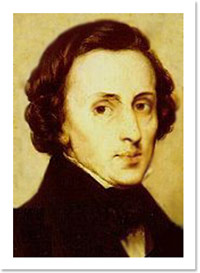
I may have heard Chopin’s Prelude No.4 a least a dozen times.
Or may have never heard it at all.
I couldn’t tell you for sure, you see.
Because there’s all this classical music playing in the background when I go to hotels. And to airports.
And I’m not paying attention.
But there was this one time I did pay attention
You see, I was listening to a presentation given by Benjamin Zander.
And Benjamin Zander didn’t just play Chopin’s Prelude No.4.
He patterned it for me (and everyone else, of course) ![]()
So how did he pattern Prelude No.4?
Well he brought my attention to the composer.
And to the music he was about to play.
And then he played it.
And I went through the first phase of patterning: recognition.
I was hearing Prelude No.4 for the first time ever.
Or rather, actually listening to Prelude No.4, for the first time.
Then Msieu Zander did something magical
He repeated the music.
Over and over.
And recognition seeped into my classical-music-starved brain.
And we moved quickly to the layering
Suddenly I wasn’t just listening to the music.
I was being shown specific notes.
Why one note made me feel happy.
Why the other note made me feel sad.
Why the Prelude seems to be struggling. Almost hitting bad notes.
How the Prelude hits so-called bad notes, and then hits the note we’ve been waiting for.
How that note gives me a sense of ‘aha, finally.’
And why that 2 minute Prelude is now an integral part of me.
If I heard it on the street. Or at an airport. Or at a hotel, I’d stop.
And listen. And understand. And try to find more layering in that pattern I know so well.
And it’s only because Benjamin Zander slowed down the pattern for me.
But he only slowed down the pattern for Prelude No.4.
I’m on my own for Prelude No.5. ![]()
Note: As a result of this one presentation, I went and bought over 80 classical pieces from iTunes. All Chopin, for starters. And to date, I’ve heard the same set over 30 times in less than five weeks. I put it on each morning as I’m writing articles, and imagine I’m this great pianist. I type faster when the music speeds up. And slow down when the music slows down. My life is richer because of Benjamin Zander’s presentation. And because he took the time to slow down the pattern for me.
To see Benjamin Zander’s presentation click here.

Excellent post. Humans are indeed pattern recognition machines, which is both a blessing and a curse. Thanks for providing more enrichment and spreading the word.
Once we do work out that we are just ‘pattern recognition’ devices, we’ll all improve rapidly in so-called talents.
Thank you SO much for this post. It has reminded me to pull out my old classical CD’s and I’m loving them.
Benjamin Zander’s presentation was nothing short of inspiring.
Because of this post, my husband actually used the presentation as part of his high school photography lesson last week. The students loved it. He plans to show it to the staff as well.
Thanks for the inspiration!
You’re welcome. It’s the one presentation I’ve watched the most as compared with any other. I show it to others too. I love the ‘possibility factor’ 🙂
I love how you say that he “slowed it down”. This seems to be a vital component in pattern recognition. When learning a language, the first few days seem frustrating, but then suddenly it slows down and the words begin to separate.
This slowing down is essentially why meditators meditate. After a 10-day silent retreat, my thought patterns slowed down to the point that I could break each thought and emotion (same thing, really) into discrete pieces. Just like separating the notes as you mention. As my mind began to see its own pattern, it gained a deeper appreciation and understanding of itself and how it works. To benefit from meditating, I don’t even really have to do anything. My mind figures out what it can do with its new understanding on its own and makes the appropriate changes.
Similar to learning a language, “I” don’t learn the language. I just continue interacting with people who speak that language and the learning just takes care of itself.
Love your articles. Thanks.
And I loved your view in return. I loved the meditation example.
Good article and comments.
An important part of learning (for me anyway) is the repetition involved in meditating on something. That seems to help me the most.
Thanks ,
Isn’t slowing down a matter of awareness? Something we unlearned in our fas moving world. It takes effort-like meditating- to slow down and see, hear and feel for the first time. I notise that I have to tell myseld again and again to be more aware of what happens arround me- if I am I get the details and understand.
Not necessarily. You can have awareness at very high speed. e.g pilots or race car drivers. It’s not the factor of slowing down or speeding up. It’s more a factor of recognising a pattern. Once you recognise it, it’s easy to see it again and again. And then build on the pattern on demand.